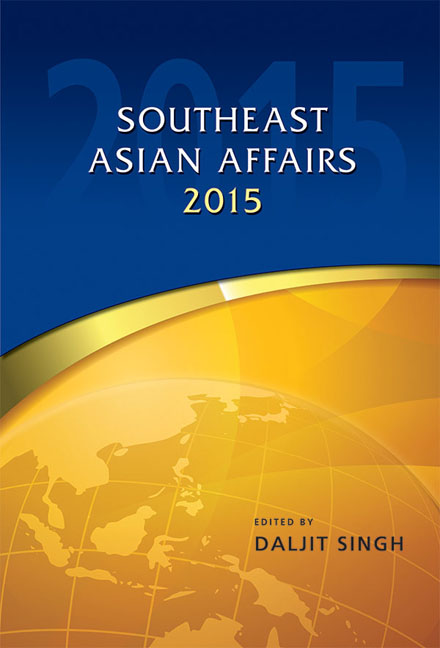Book contents
- Frontmatter
- Contents
- Foreword
- Introduction
- Acknowledgements
- THE REGION
- Seeking Stability in Turbulent Times: Southeast Asia's New Normal?
- China's Two Silk Roads Initiative: What It Means for Southeast Asia
- Southeast Asian Economies: Striving for Growth
- BRUNEI DARUSSALAM
- CAMBODIA
- INDONESIA
- LAOS
- MALAYSIA
- MYANMAR
- THE PHILIPPINES
- SINGAPORE
- THAILAND
- TIMOR-LESTE
- VIETNAM
Southeast Asian Economies: Striving for Growth
from THE REGION
Published online by Cambridge University Press: 19 May 2017
- Frontmatter
- Contents
- Foreword
- Introduction
- Acknowledgements
- THE REGION
- Seeking Stability in Turbulent Times: Southeast Asia's New Normal?
- China's Two Silk Roads Initiative: What It Means for Southeast Asia
- Southeast Asian Economies: Striving for Growth
- BRUNEI DARUSSALAM
- CAMBODIA
- INDONESIA
- LAOS
- MALAYSIA
- MYANMAR
- THE PHILIPPINES
- SINGAPORE
- THAILAND
- TIMOR-LESTE
- VIETNAM
Summary
Growth prospects for Southeast Asia in 2014 turned out to be less than what many expected earlier in the year. The International Monetary Fund (IMF) and the Asian Development Bank (ADB) lowered the growth forecast for regional economies in their fourth quarter 2014 flagship publications by 0.2 and 0.4 percentage points respectively relative to what they had perceived earlier in the year (see Table 1). These changes imply more pessimistic perceptions about how the region's economies will fare in terms of their growth as more data became available. As a consequence, according to ADB estimates, aggregate GDP growth for all Southeast Asian economies in 2014 moderated to 4.6 per cent relative to 5.0 per cent in 2013, marking the second consecutive slowdown in economic activities of the region. Inflation, however, is projected to be relatively stable at slightly above 4 per cent.
Despite the trend of general slowdown, there are differences in the performance of each individual country (Table 1). Downward corrections for the projection of 2014 growth rate were obvious in the case of Indonesia, Philippines, Singapore and Thailand. Malaysia, on the contrary, is marked with an upward correction, an improvement in economic growth performance relative to the previous year. This paper provides a discussion on what is behind the general slowdown in growth of the region and a glimpse at the prospects going forward.
Large Economies Dominated the Slowdown
Aggregate GDP growth rate in the ten Southeast Asian economies decelerated for a second year in a row, to 4.6 per cent in 2014 from 5.0 per cent in 2013 and 5.7 per cent in 2012. The softer growth rate was primarily driven by slower growth in the region's four biggest economies, which occupy about 76 per cent of the Southeast Asia's total output (see Figure 1). Indonesia and Thailand, the two largest economies in Southeast Asia, have dragged down the region's growth over the past two years. In particular, the regional growth performance in 2014 was affected by political instability in Thailand that saw a contraction of the economy in the first half of the year and an unexpectedly sharp slowdown in Indonesia that brought growth to its weakest in five years. By contrast, Malaysia, the third largest economy in the region, was performing much better than expected and was forecast to expand at its strongest pace in four years.
- Type
- Chapter
- Information
- Southeast Asian Affairs 2015 , pp. 46 - 64Publisher: ISEAS–Yusof Ishak InstitutePrint publication year: 2015

